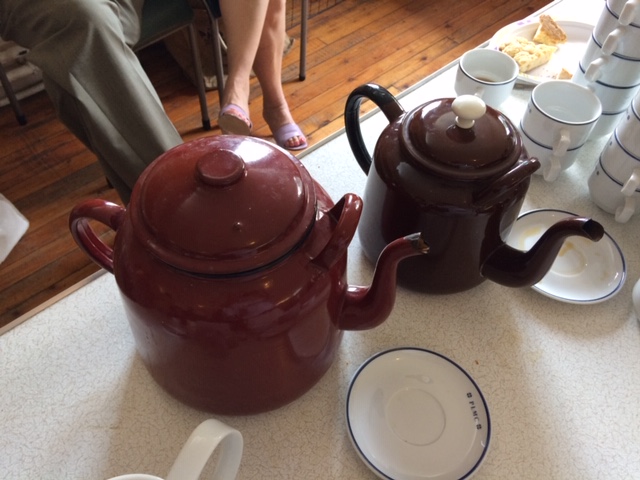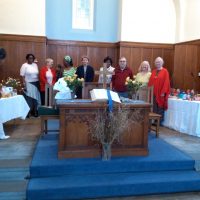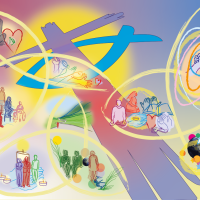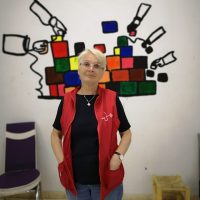In May, Jamie and I joined a party of URC people, led by Michael
Hopkins, to see the Oberammergau Passion Play. The play was
devised as an act of thanksgiving by the village of Oberammergau
after they were spared from the Plague in 1633, and has been
performed every 10 years since 1680. It was cancelled in 2020
because of the pandemic but, oddly enough, this second ‘plague’
meant we could both go – Jamie’s teaching year had been
rescheduled after lockdown, leaving him free to get away this
year.
The trip began with 4 days in the beautiful Austrian Tyrol. We
visited Salzburg, Kitzbühl and Innsbruck, saw castles, a nature
reserve (real chamois!), and some wildly ornate churches. One
afternoon, we stayed near our hotels and took a cable car up the
mountain behind to a breathtaking view of snow-clad mountains
– like being on top of the world.
On the 5 th day, we crossed the border to Oberammergau, in
southern Germany, for the play. The performance is in two parts:
2.30-5pm, then 8-10.30pm, so we had some lunch and then went
to take our places. From the moment the play began, I was
spellbound. Two choirs, each of at least 50 people each, glided
onto the stage and stood completely still. The orchestra began,
and the choir sang like angels. As they filed off, hundreds of
people, men, women and children, poured onto the stage in a
tumult of noise and celebration, ready to welcome Jesus on Palm
Sunday.
The action covers that final week in Jerusalem, from Palm Sunday
to Easter, though it took in other teachings of Jesus, and added
quite a bit of additional material to give background and context.
Pontius Pilate and Judas both appeared much earlier than in the
gospels, so that we saw, from early on, some of the tensions and
pressures stacked up against Jesus. Judas was shown as an
idealistic young man tricked by the priests into betraying Jesus,
and then horrified to discover what he had done. Pilate, in
armour, riding on a black horse, made sinister threats to anyone
who challenged the Romans, but was in the end very unwilling to
condemn Jesus. I was glad that we were each given an English
translation of the text, so we were able to follow the arguments.
Interspersed with the action were scenes from the Old
Testament, presented as living tableaux, making connections
between those stories and the life of Jesus. At the end of the play,
there was no resurrection scene. Instead, an angel handed out lit
candles to the disciples and women, light for them to take into
the world. And much food for thought for the audience, too.
The whole village is involved in the production, on or off stage, or
in offering hospitality. The logistics of the event were amazing.
The theatre seats 4,500 people but the village never seemed
crowded. Hotels were given meal tickets for each audience
member, so during the meal break everyone knew where to go
and was able to be back on time. Even the coach parking was
arranged so that there were no queues to get home.
It was a wonderful experience, never to be forgotten.
Sue








